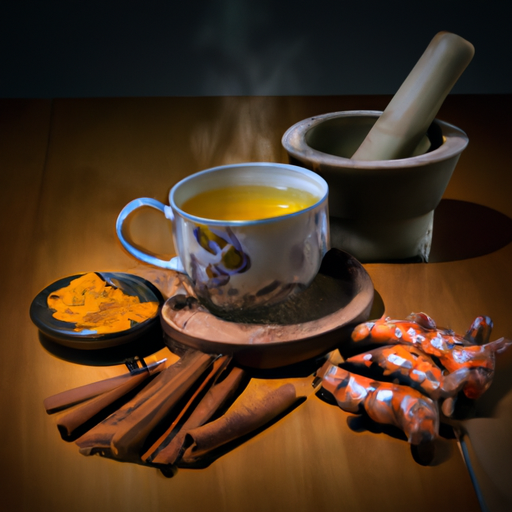The healing properties of natural remedies have always captured my interest. Thus, when I came across information about turmeric tea, it piqued my curiosity. For centuries, turmeric has served a pivotal role in Ayurvedic medicine, celebrated for its strong anti-inflammatory and antioxidant qualities.
But what exactly are the benefits of drinking turmeric tea? After doing some research, I discovered that turmeric tea can improve immune function, reduce inflammation, promote heart health, boost digestion, support joint health, and even improve skin health. These impressive benefits make it clear why so many people are turning to this golden elixir as a daily ritual.
In this article, I’ll dive into the science behind these claims and show you how to make your own delicious cup of turmeric tea at home.
Key Takeaways
- Turmeric tea has anti-inflammatory and antioxidant properties that can improve immune function and reduce inflammation.
- It also has numerous health benefits, including promoting heart health, boosting digestion, supporting joint health, and improving skin health.
- However, precautions should be taken when consuming turmeric, as it can cause stomach upset and other side effects in some individuals.
- To maximize the health benefits of turmeric, it’s important to consume moderate amounts and to ensure that turmeric supplements contain black pepper extract to increase absorption of curcumin.
Understanding the Basics of Turmeric Tea
Delving into the fundamentals of turmeric tea can provide one with a deeper understanding of the numerous benefits that are associated with its consumption. Turmeric tea is made by brewing grated or ground turmeric root in hot water. This drink has been used for centuries as a natural remedy for various health issues and is believed to have anti-inflammatory, antioxidant, and immune-boosting properties.
There are different variations of turmeric tea, each with its unique taste and aroma. Some people prefer to add ginger, cinnamon, or honey to their brew to enhance the flavor. Others opt for coconut milk or almond milk to make it creamier and more filling. Regardless of how you choose to prepare your turmeric tea, it’s important to use high-quality ingredients and follow proper brewing techniques to ensure maximum potency and effectiveness.
To make a basic turmeric tea, simply heat up some water until it reaches boiling point. Add one teaspoon of grated or ground turmeric root per cup of water and let it simmer for 5-10 minutes. Strain the liquid through a fine-mesh sieve or cheesecloth before serving. You can enjoy your turmeric tea hot or cold, depending on your preference.
With this knowledge about basic preparation techniques, we can now delve into the anti-inflammatory properties associated with drinking turmeric tea without delay!
Anti-Inflammatory Properties
You’ll feel the soothing effects of turmeric’s anti-inflammatory power as it works to calm your body’s response to inflammation. This is especially important for those dealing with chronic pain or inflammatory conditions such as arthritis.
Turmeric tea contains curcumin, which has been shown to be effective in reducing inflammation and pain in the body. To take advantage of turmeric’s anti-inflammatory properties, you can also try taking turmeric supplements or using other alternative remedies such as turmeric capsules or creams. These options may provide additional benefits for those who need a more concentrated form of curcumin to help manage their symptoms.
In addition to its ability to combat inflammation, turmeric has also been shown to have antioxidant properties that can boost the immune system. By incorporating this powerful spice into your daily routine through drinking turmeric tea or taking supplements, you can reap the many benefits that come from supporting your body’s natural defenses against illness and disease.
Immune System Boost
If you want to give your immune system a boost, incorporating turmeric into your daily routine can help. Turmeric contains compounds such as curcumin that have been shown to possess immune system strengthening properties.
Research has revealed that curcumin helps to stimulate the production of white blood cells which are essential in fighting off infections and diseases. Turmeric has also been shown to possess anti-viral, anti-fungal and anti-bacterial properties which can further enhance its ability to strengthen the immune system. These properties help prevent pathogens from multiplying within the body thereby reducing the risk of infections or other illnesses caused by these pathogens.
Incorporating turmeric into your diet or taking turmeric supplements is an excellent natural remedy for boosting your immunity. Incorporating turmeric into your daily routine is a practical way of enhancing your immune system. You can easily add it to your meals, make turmeric tea or take it in supplement form.
The benefits of consuming this spice go beyond just strengthening the immune system; it also improves digestive health, reduces inflammation and increases brain function among others. So why not give this natural remedy a try today?
With all these benefits in mind, let’s move on to discussing how turmeric can improve digestive health.
Digestive Health
I’ve been reading up on the potential digestive benefits of turmeric tea, and there are two key areas that stand out to me:
- reducing bloating and gas
- improving gut health
Some studies have shown that turmeric may help alleviate symptoms of bloating and gas by promoting better digestion and reducing inflammation in the gut. Additionally, turmeric contains compounds that can support the growth of beneficial bacteria in the gut, which is essential for overall digestive health.
Potential Benefits for Reducing Bloating and Gas
Feeling bloated and gassy can be a real pain in the gut, but sipping on some turmeric tea could help alleviate those uncomfortable symptoms. Here are five potential benefits of drinking turmeric tea for reducing bloating and relieving gas:
- Turmeric contains curcumin, which has anti-inflammatory properties that may help reduce inflammation in the digestive tract.
- Turmeric has been shown to stimulate the production of bile, which helps break down fats and aids in digestion.
- Turmeric may help relax the muscles in the digestive system, reducing cramping and discomfort associated with bloating.
- Drinking warm liquids like turmeric tea can help stimulate digestion and relieve constipation, which can contribute to bloating.
- The antioxidants in turmeric may also help protect against oxidative stress caused by gas-producing bacteria in the gut.
Incorporating turmeric tea into your daily routine could potentially provide relief from bloating and gas. But that’s not all – there are even more potential benefits for improving gut health which we’ll explore next.
Potential Benefits for Improving Gut Health
Improving gut health can be as simple as adding a warm and comforting beverage to your daily routine, like sipping on a steaming cup of golden-hued goodness. Turmeric tea has potential benefits for improving gut health because of its fermentation process and probiotic effects.
The fermentation process involved in making turmeric tea helps increase the number of beneficial bacteria in our gut, which can improve digestion and overall gut health. Moreover, the probiotic effects of turmeric tea help balance out the bad bacteria with good ones in our digestive system.
This is important because an imbalance can lead to various digestive issues such as bloating, gas, or constipation. Drinking turmeric tea regularly may help alleviate these symptoms by promoting healthy digestion. As we move into discussing heart health benefits, it’s worth noting that maintaining good gut health is also linked to better cardiovascular outcomes.
Heart Health
Turmeric tea is known to help lower cholesterol levels, reducing the risk of heart disease. This is because turmeric contains a compound called curcumin, which has anti-inflammatory properties that can help prevent damage to the walls of our blood vessels. By reducing inflammation in our bodies, turmeric tea can also improve circulation and protect against blood clots.
One way to incorporate turmeric tea into your healthy lifestyle is by trying out some delicious and nutritious recipes. For example, you could add a teaspoon of ground turmeric to your smoothie or mix it with warm almond milk for a cozy bedtime drink. You could also make a refreshing iced tea with fresh ginger and lemon juice for a summer treat.
In addition to its potential benefits for heart health, research suggests that turmeric may also have positive effects on brain function. By incorporating this powerful spice into your diet and making other lifestyle changes like getting regular exercise and practicing stress-reducing techniques, you can take steps towards improving not only your physical health but also your mental well-being.
Brain Health
Although often overlooked, our brain health is just as important as our physical health, and incorporating certain lifestyle changes can lead to positive outcomes.
One such change is drinking turmeric tea. Studies have shown that curcumin, the active ingredient in turmeric, has neuroprotective properties that may improve memory and cognitive function. To further support this point, a study published in the American Journal of Geriatric Psychiatry found that participants who took a daily curcumin supplement for 18 months experienced significant improvements in memory and attention compared to those who took a placebo. Additionally, another study published in the Journal of Psychopharmacology showed that taking curcumin supplements improved working memory and mood for individuals with mild age-related memory loss.
If you’re looking for a natural way to boost your brain health, consider incorporating turmeric tea into your daily routine. Not only does it have potential cognitive benefits, but it also has anti-inflammatory properties that can help reduce overall inflammation in the body – which has been linked to numerous chronic diseases. Plus, it’s easy to make at home by steeping fresh or powdered turmeric in hot water with some black pepper (which helps increase absorption).
Moving on to joint health…
Joint Health
You can enhance the health of your joints by implementing certain lifestyle changes and incorporating natural remedies. One such remedy is turmeric tea, which has been shown to have anti-inflammatory properties that can help alleviate joint pain and stiffness. Turmeric contains a compound called curcumin, which has been found to reduce inflammation in the body.
To reap the benefits of turmeric for joint health, you can either consume it as a supplement or make it into tea. When choosing a turmeric supplement, be sure to look for one that contains black pepper extract, which can increase the absorption of curcumin by up to 2,000%.
As for turmeric tea recipes, there are several variations you can try. One simple recipe involves steeping 1 teaspoon of ground turmeric in hot water with honey and lemon juice.
In addition to drinking turmeric tea or taking supplements, other lifestyle changes that can benefit joint health include maintaining a healthy weight, staying active with low-impact exercise like yoga or swimming, and eating an anti-inflammatory diet rich in fruits and vegetables. By making these changes and incorporating natural remedies like turmeric into your routine, you can improve your joint health and overall wellbeing.
Speaking of wellbeing – did you know that turmeric also has benefits for skin health? Let’s explore this next topic further.
Skin Health
I’ve been researching the potential benefits of turmeric tea for skin health, and I’ve found some interesting information.
First off, it seems that drinking turmeric tea could help reduce inflammation and acne due to its anti-inflammatory properties.
Additionally, there’s evidence to suggest that turmeric may improve skin elasticity and texture by promoting collagen production.
Overall, it seems like incorporating turmeric tea into my daily routine could be a simple way to support healthy, glowing skin!
Potential Benefits for Reducing Inflammation and Acne
Turmeric tea can help reduce inflammation and acne, making it a great addition to your daily routine. The active ingredient in turmeric, curcumin, has been shown to have anti-inflammatory properties. This can not only improve weight loss efforts but also be effective against chronic diseases such as arthritis and inflammatory bowel disease. By reducing inflammation in the body, turmeric tea can help prevent breakouts by keeping pores unclogged.
In addition to reducing inflammation, turmeric tea may also have potential benefits for improving skin elasticity and texture. Curcumin has been found to stimulate collagen production, a protein that helps keep skin firm and supple. This could lead to a reduction in fine lines and wrinkles over time. So, not only will you be doing your body a favor by drinking turmeric tea for its anti-inflammatory properties, but you may also see improvements in the health of your skin.
Potential Benefits for Improving Skin Elasticity and Texture
One may be surprised to learn that the active ingredient in turmeric, curcumin, has been found to stimulate collagen production and potentially improve skin elasticity and texture. This means that drinking turmeric tea could benefit your skin by improving hydration levels and reducing fine lines.
Collagen is a protein that’s essential for healthy skin, as it provides structure and support. As we age, our bodies produce less collagen, which can result in sagging skin and wrinkles. Drinking turmeric tea on a regular basis could help boost collagen production in your body, leading to firmer and more youthful-looking skin.
Additionally, turmeric’s anti-inflammatory properties may also contribute to improved skin health by reducing redness and irritation. So not only does turmeric tea offer potential benefits for reducing inflammation and acne (as discussed previously), but it could also help improve the overall appearance of your skin.
Now let’s move onto how to make this magical elixir!
How to Make Turmeric Tea
First, you’ll need to gather your ingredients for making a delicious cup of turmeric tea. Turmeric is the star of the show, but you can add other spices and flavors to suit your taste preferences. Some popular variations include adding ginger for an extra kick, honey or maple syrup for sweetness, or lemon juice for a tangy twist. Here’s a simple recipe to get you started:
| Ingredient | Amount |
|---|---|
| Turmeric powder | 1 teaspoon |
| Cinnamon powder | ½ teaspoon |
| Black pepper | A pinch |
| Water | 2 cups |
| Honey or maple syrup (optional) | To taste |
To make the tea, simply bring the water to a boil in a small saucepan. Add all the spices and let them simmer for 10-15 minutes on low heat. Strain the mixture into your favorite mug and sweeten with honey or maple syrup if desired. Sip and enjoy!
Drinking turmeric tea as a morning ritual has many benefits beyond just its delicious taste. The anti-inflammatory properties of curcumin found in turmeric have been shown to improve brain function, lower risk of heart disease, and even reduce symptoms of depression. Plus, starting your day with a warm cup of tea can help stimulate digestion and boost metabolism.
As with any new food or beverage addition to your diet, it’s important to be aware of potential precautions and side effects. While turmeric is generally considered safe when consumed in moderation as part of a balanced diet, some people may experience stomach upset or allergic reactions. It’s always best to consult with your healthcare provider before incorporating any new supplements or remedies into your routine.
Precautions and Potential Side Effects
Before you start incorporating turmeric into your diet, it’s important to be aware of potential precautions and side effects. While turmeric is generally considered safe, some people may experience adverse reactions. These can include stomach upset, diarrhea, nausea, and dizziness.
In order to avoid any negative side effects when drinking turmeric tea, there are a few precautionary measures that you should take. For example, if you have a history of gallbladder problems or kidney stones, it’s best to consult with your doctor before starting to drink turmeric tea on a regular basis. Additionally, pregnant women should also exercise caution when consuming turmeric as it could stimulate the uterus.
It’s also worth noting that taking too much turmeric can lead to further complications. In large doses (more than 8 grams per day), turmeric has been linked with liver problems and an increased risk of bleeding in some individuals. Therefore, it’s important to consume moderate amounts of turmeric and only drink the recommended dosage of turmeric tea per day.
As with any new dietary supplement or change in diet, it’s always best to speak with your healthcare provider before making any significant changes.
Frequently Asked Questions
Can turmeric tea cure specific diseases?
As someone who’s experienced the benefits of turmeric tea firsthand, I can confidently say that it does have potential for aiding in specific diseases and boosting immunity. Studies have shown that the active compound in turmeric, curcumin, has anti-inflammatory properties that may help with conditions such as arthritis and digestive issues.
Additionally, some research suggests that turmeric may have a positive impact on heart health and even cancer prevention. While more research is needed to fully understand its effects on specific diseases, incorporating turmeric tea into your daily routine can certainly contribute to a healthier immune system overall.
So why not give it a try? It’s an easy and tasty way to potentially improve your health.
Is it safe to consume turmeric tea while pregnant or breastfeeding?
As someone who’s currently pregnant, I was curious about the safety of consuming turmeric tea during pregnancy and breastfeeding. After some research, I found that turmeric has been used in traditional medicine for centuries and is generally considered safe for consumption in moderate amounts.
However, it’s important to note that there haven’t been enough studies conducted on its effects during pregnancy and breastfeeding to make a definitive conclusion. Therefore, it’s recommended to consult with your healthcare provider before consuming turmeric tea while pregnant or breastfeeding.
It’s better to be cautious when it comes to the health of both you and your baby.
Is it okay to consume turmeric tea on a daily basis?
I consume turmeric tea on a daily basis, but as with any supplement or herb, there are pros and cons to consider.
The recommended dosage of turmeric is 500-2,000 mg per day, and it’s important to note that high doses can cause gastrointestinal issues.
However, the benefits of consuming turmeric regularly include its anti-inflammatory properties which can alleviate pain and reduce the risk of chronic diseases like cancer and Alzheimer’s.
Additionally, turmeric has been shown to boost immune function and aid in digestion.
Overall, I believe that consuming turmeric tea on a daily basis is a safe and effective way to improve overall health when done within the recommended dosage range.
Are there any interactions between turmeric tea and medications?
When it comes to turmeric tea, potential drug interactions are a concern for some people. It’s important to talk to your doctor before adding this tea to your routine, especially if you’re taking prescription medications.
Turmeric can interact with blood thinners, diabetes medications, and certain antidepressants. Additionally, it’s recommended that you don’t consume more than 1-2 teaspoons of turmeric per day.
This means that drinking turmeric tea once or twice a day is likely safe for most people as long as they’re not exceeding the recommended dosage and have talked with their doctor about any potential drug interactions.
Can turmeric tea help with weight loss?
Losing weight can be a challenging task, but incorporating turmeric tea into your daily routine may be a helpful aid. Turmeric tea has been shown to have numerous benefits for the body, including reducing inflammation and improving digestion.
These benefits can indirectly contribute to weight loss by promoting a healthy gut and reducing the risk of chronic illnesses that may lead to excess weight gain. Additionally, turmeric contains curcumin, a compound with antioxidant properties that’s been linked to improved metabolic function and fat-burning potential in some studies.
While drinking turmeric tea alone isn’t a guaranteed solution for weight loss, it can certainly complement other lifestyle changes such as exercise and healthy eating habits.
Conclusion
Wow, after researching the benefits of turmeric tea, I’m convinced that it’s a must-try for everyone! The anti-inflammatory properties alone make it worth incorporating into your daily routine.
Not to mention the immune system boost, digestive health benefits, and positive effects on heart, joint, and skin health. Making turmeric tea is easy and affordable, so there’s no reason not to give it a try.
Just be sure to follow precautions and be aware of potential side effects. With all the evidence-based research supporting its health benefits, adding turmeric tea to your diet could be one of the best decisions you make for your overall well-being.
So why not give it a shot? Your body will thank you for it!










